Kazakhstan had been a part of the Soviet Union since 1920 and between 1926 and 1939, it lost 22% of it's population to starvation, violence and mass emigration. Many Kazakh writers, poets, politicians and historians were killed on orders from Joseph Stalin as part of plans to suppress Kazakh identity and culture. During the 1930s and 1940s millions of people exiled from other parts of the Soviet Union were relocated to Kazakhstan, in many cases to large labor camps. By 1959, Kazakhs were a minority in their own country, accounting for only 30% of the population, while 43% were now Russians.
One of the most controversial elements of Soviet control over Kazakhstan was the Soviet leadership's decision to use lands in Kazakhstan for testing of nuclear weapons starting in 1949, causing catastrophic ecological and biological effects felt generations later, causing even greater anger toward the Soviet system when the long term effects of nuclear activity became known.
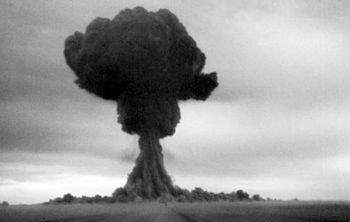
A Soviet Nuclear test in Kazakhstan
Growing tensions within the Soviet Union led to a demand for political and economic reform in the 1980s, and came to a head in the early 1990s. When the Soviet Union dissolved, Kazakhstan declared it's independence on this date in 1991, the last Soviet republic to do so in part because of Kazakhstan's leadership feeling that the various republics of the Soviet Union were too interdependent economically to survive separation from each other.
Kazakhstan's Independence Day is normally celebrated for two days, December 16th and 17th. Speeches, songs and performances, dressing in traditional clothing are all a part of the traditional festivities.
Three women in traditional Kazakh clothing
Many villages will set up a yurt, a large tent used in the past by nomad Kazakhs, where local delicacies are served are traditional parts of the celebrations.
The interior of a Kazakh yurt
Visits to friends and relatives are made, with gifts of flowers or candies given. Tournaments with traditional games and races are held, and accompanied by other activities such as parades and fireworks.
Kazakhstan is the ninth-largest country in the world and the largest landlocked one. It is located primarily in Asia. It's population mix has swung back toward Kazakhs, who now make up 67% of the population, with Russians at 21%.
In hockey, the Kazakhstan National Team made their World Championships debut in 1993 in "Pool C", the third level at the time, finishing 3rd. They have made a steady climb from their early days, and in 1996 they won "Pool C", earning promotion to the "Pool B". Seven years later, Kazakhstan won the Division 1, Group A (the equivalent to the old "Pool B") in 2003, earning a place in the Top Level for 2004.
After two years of avoiding relegation, they were relegated in 2006 back to Division 1, and finished first in Division 1, Group A early in 2009, earning a promotion back to the Top Level for 2010 beginning a cycle of promotion and relegation which saw them demoted in 2010, promoted in 2011, demoted again in 2012, promoted back to the Top Division in 2013, relegated in 2014, promoted in 2015 and once again relegated in 2016.
Kazakhstan has competed at the 1998 and 2006 Winter Olympics, finishing in 8th place in 1998. They did not qualify in 1994, 2002, 2010, fell short by a single point in 2014 and were unsuccessful most recently for 2018.
Nikolai Antropov became the first ever Kazakh player drafted by the NHL when he was picked in the first round by the Toronto Maple Leafs in 1998. Antropov, a right winger, would play nine years with the Maple Leafs, two seasons with the Atlanta Thrashers and two more with the Winnipeg Jets after the franchise relocated. His final NHL totals were 788 games played, 193 goals and 272 assists for 465 points with his best season being 2009-10 with Atlanta when he scored 24 goals and 67 points.
He finished his playing career with two seasons back in Kazakhstan with Barys Astana. Antropov also played for Kazakhstan at the World Junior Championships in 1997, 1998 and 1999, the World Championships in 1998 and 2014 and the 2006 Olympics.
The other notable Kazakh to have played in the NHL include goaltender Evgeni Nabokov, although he is a Russian citizen and chose to play for Russia in international competitions, he did play for Kazakhstan in the 1994 World Championships.
Only four other Kazakhs have played in the NHL, wingers Konstantin Pushkarev (17 games with the Los Angeles Kings in 2006-07) and Konstantin Shafranov (5 games with the St. Louis Blues in 1996-97) and goaltenders Vitaly Kolesnik (8 games with the Colorado Avalanche in 2005-06) and Vitali Yeremeyev (4 games with the New York Rangers in 2000-01).
 Konstantin Pushkarev
Konstantin Pushkarev
The best known club hockey team of the seven in Kazakhstan is Barys Astana, which competes in the primarily Russian Kontinential Hockey League (KHL). The club was founded in 1999 and played in the Kazakhstan Hockey Championship until 2004 when they joined the Russian hockey system, starting out in the third level. They won the Ural-Western Sibera Zone in 2007 and were promoted to the second level, spending the 2007-08 season in the Vysshaya Liga prior to gaining acceptance into the new Kontinental Hockey League for its inaugural 2008-09 season. In parallel with its KHL schedule, Barys has also won Kazakhstan championships in 2008 and 2009. The popularity of the club can be illustrated by the club's move from the 4,070 seat Kazakhstan Sports Palace to the brand new Barys Arena, which has a capacity of 12,000 fans.
NHL veterans Antropov and Yeremeyev both have played for the club, whose roster is dominated by Kazakhs, as 28 of 32 of their players are homegrown talent.
Today's featured jersey is a 2004 Kazakhstan National Team Roman Kozlov jersey as worn in the 2004 World Championships featuring a pair of our custom made Zepter sponsorship patches on the sleeves. Kazakhstan did end up in the relegation round after three preliminary round losses, but successfully defended their place by winning the group with victories over France and Japan along with tying Ukraine.
This style was worn from 1998 to 2004 with some variations along the way, such as the addition of the name Kazakhstan below the crest in 2003 and the side panels being white in 2001 and 2002.
This well traveled jersey was purchased on ebay from a seller in Australia of all places. It arrived already customized, but given the choice, we would have opted for one of the much longer names frequently found on the Kazakh national team roster, with names of 10-14 letters long being common.
Kozlov has competed for Kazakhstan on seven different occasions, including the European Junior Championships in 1999, the World Juniors in 2001 and the World Championships every year from 2001 to 2005 with a record of 27 games, 3 goals and 6 assists for 9 points and has spent his professional career in the Vysshaya Liga, the second level of Russian hockey.
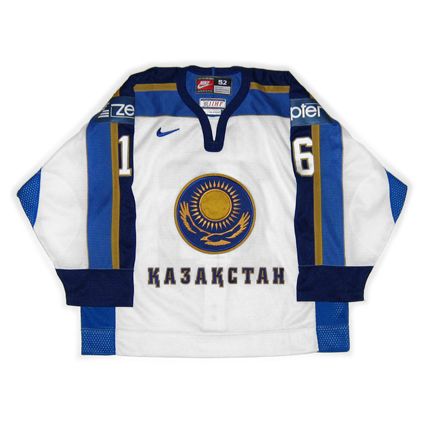
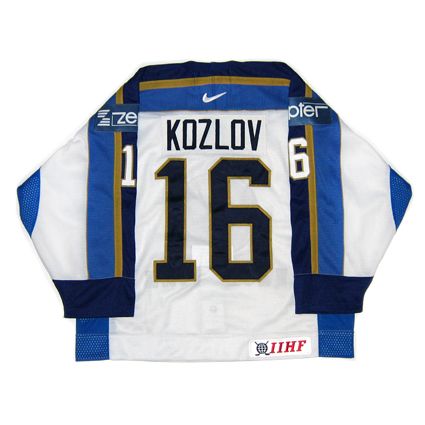
Bonus jersey: Today's bonus jersey is a Toronto Maple Leafs Nikolai Antropov jersey as worn by the most accomplished NHL player from Kazakhstan.
After wearing it as a throwback jersey for the closing of Maple Leaf Gardens in 1999, the Maple Leafs brought it back as an alternate jersey for the 2000-01 season. The club wore this style through the 2006-07 season when all third jerseys were dropped for the 2007-08 season with the change to the new Reebok Edge jerseys. An Edge version of this jersey was then reinstated for the 2008-09 season and worn through the 2010-11 season.
This brief video shows Kazakhstan qualifying for the 2006 Winter Olympics in Torino, Italy.


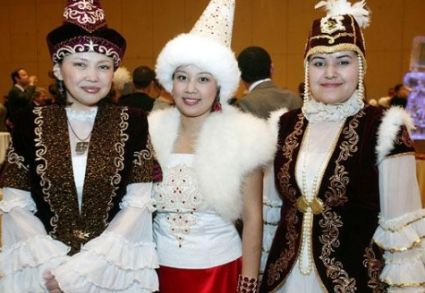
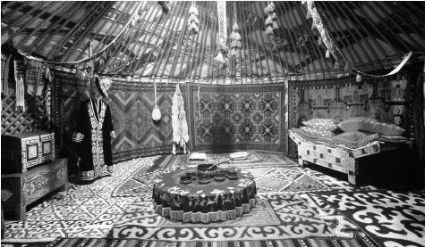
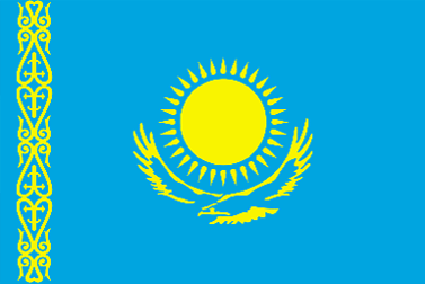


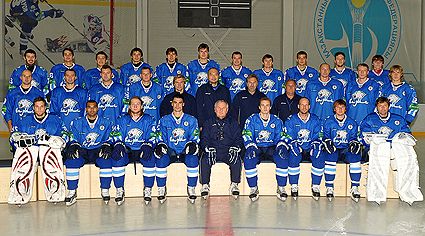


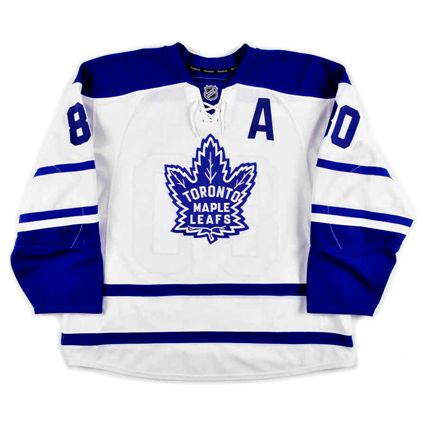
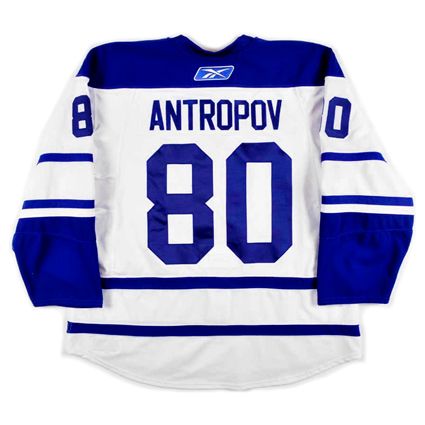










No comments:
Post a Comment
We welcome and encourage genuine comments and corrections from our readers. Please no spam. It will not be approved and never seen.